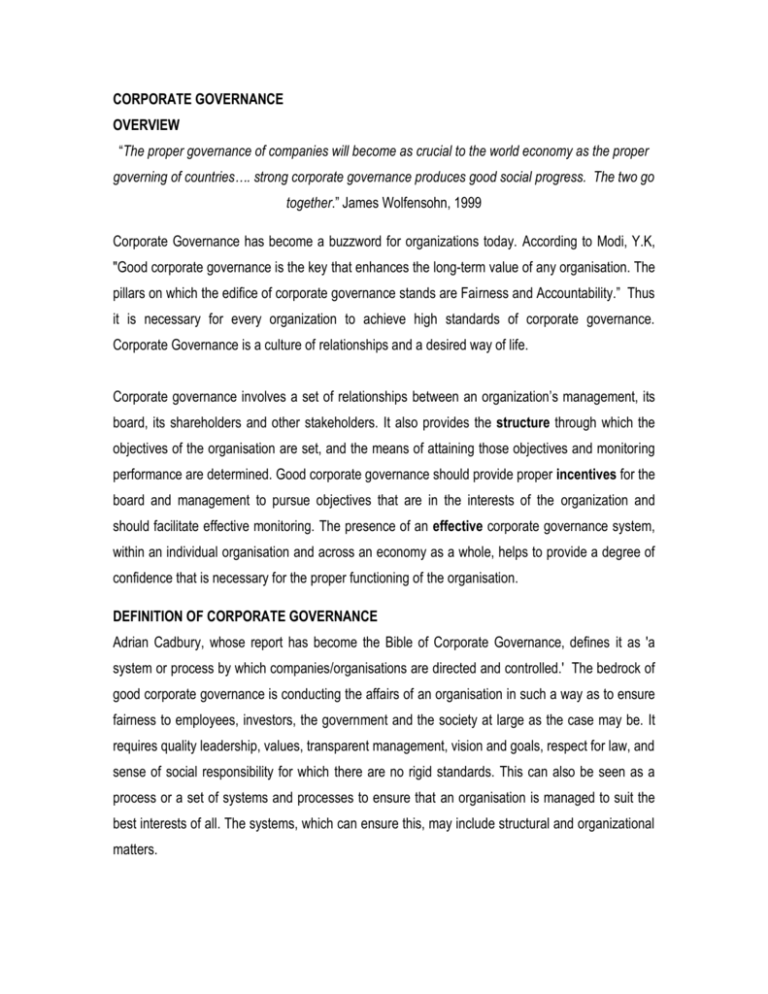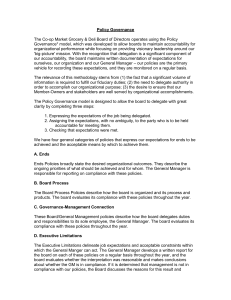CORPORATE GOVERNANCE OVERVIEW “The proper governance
advertisement

CORPORATE GOVERNANCE OVERVIEW “The proper governance of companies will become as crucial to the world economy as the proper governing of countries…. strong corporate governance produces good social progress. The two go together.” James Wolfensohn, 1999 Corporate Governance has become a buzzword for organizations today. According to Modi, Y.K, "Good corporate governance is the key that enhances the long-term value of any organisation. The pillars on which the edifice of corporate governance stands are Fairness and Accountability.” Thus it is necessary for every organization to achieve high standards of corporate governance. Corporate Governance is a culture of relationships and a desired way of life. Corporate governance involves a set of relationships between an organization’s management, its board, its shareholders and other stakeholders. It also provides the structure through which the objectives of the organisation are set, and the means of attaining those objectives and monitoring performance are determined. Good corporate governance should provide proper incentives for the board and management to pursue objectives that are in the interests of the organization and should facilitate effective monitoring. The presence of an effective corporate governance system, within an individual organisation and across an economy as a whole, helps to provide a degree of confidence that is necessary for the proper functioning of the organisation. DEFINITION OF CORPORATE GOVERNANCE Adrian Cadbury, whose report has become the Bible of Corporate Governance, defines it as 'a system or process by which companies/organisations are directed and controlled.' The bedrock of good corporate governance is conducting the affairs of an organisation in such a way as to ensure fairness to employees, investors, the government and the society at large as the case may be. It requires quality leadership, values, transparent management, vision and goals, respect for law, and sense of social responsibility for which there are no rigid standards. This can also be seen as a process or a set of systems and processes to ensure that an organisation is managed to suit the best interests of all. The systems, which can ensure this, may include structural and organizational matters. It is concerned with accountability of persons who are managing an entity and has to do with the morals, ethics, values, conduct and behaviour of the organisation and its management. According to the institute of company secretaries of India, “Corporate Governance is the application of best Management Practices, Compliance of Laws in true letter and spirit and adherence to ethical standards for effective management and distribution of wealth and discharge of social responsibility for sustainable development of all stakeholders.” Scholars and practitioners of corporate governance give the term a wide variety of definitions. Economists and social scientists tend to define it broadly as "the institutions that influence how business corporations allocate resources and returns" and "the organizations and rules that affect expectations about the exercise of control of resources in firms." One noted economist has rather cryptically written that governance is “an institutional framework in which the integrity of the transaction is decided." These definitions focus not only on the formal rules and institutions of corporate governance, but also on the informal practices that evolve in the absence or weakness of formal rules. The concept of corporate governance has grown in prominence in recent times. In the wake of Enron, WorldCom, Adelphia Communications and an ever-lengthening litany of corporate malpractice scandals, finding new ways to protect average investors has become an international priority. It is, therefore, not surprising that corporate governance reform is gaining importance as a crucial mechanism for addressing the erosion of investor confidence. As professed by Scott (1999), corporate governance in its most comprehensive sense, includes every force that bears on the decision-making of an institution. That would encompass not only the control rights of stockholders, but also the contractual covenants and insolvency powers of debt holders, the commitments entered into with employees and customers and suppliers, the regulations issued by governmental agencies, and the statutes enacted by parliamentary bodies. One could go still further, to bring in the social and cultural norms of the society. All are relevant, but the analysis would become so diffuse that it risks becoming unhelpful as well as unbounded. Thus the United Kingdom’s 1992 Cadbury Report‘s often quoted definition is: “Corporate governance is the system by which businesses are directed and controlled.” As applied in practice, this narrower definition focuses almost exclusively on the internal structure and operation of the corporation’s decision-making processes. It has been this narrower definition that has been central to public policy discussions about corporate governance in most countries. For example, the OECD Principles of Corporate Governance deal with only 5 governance issues: The Rights of Shareholders; The Equitable Treatment of Shareholders; The Role of Stakeholders in Corporate Governance; Disclosure and Transparency; and The Responsibility of the Board. At the same time, as will be seen, countries within the UNECE region have applied and elaborated upon these narrower definitions in different ways. This chapter will focus primarily on the formal rules and institutions of corporate governance in UNECE countries. OBJECTIVES OF CORPORATE GOVERNANCE Corporate Governance is aimed at creating an organization which maximizes the efforts of stakeholders. It envisages an organization in which emphasis is laid on fulfilling the social responsibilities towards the stakeholders in addition to the impact it creates. The objectives of Corporate Governance are to ensure the following: 1. Properly constituted management/leadership capable of taking independent and objective decisions. 2. Management/leadership is independent and impartial. 3. Management adopts transparent procedures and practices. 4. Management has an effective machinery to serve the concerns of the Stakeholders. 5. Management to monitor the functioning of the Management Team. 6. Management remains in effective control of the affairs of the organisation. The concept of Corporate Governance hinges on total transparency, integrity and accountability of the management. It is a system of making management accountable to the stakeholders for effective management of the organisation, in the interests of the organisation and also with adequate concern for ethics and values. Corporate Governance recognizes issues like maintaining continuity by succession planning, identifying opportunities, facing challenges and managing changes within the business and allocation of resources towards the right priority. Corporate Governance mainly consists of two elements - A long-term relationship, which has to deal with the checks and balances, incentives of mangers and communications between the management and the investors and - A transactional relationship involving matters relating to disclosure and authority. Corporate Governance deals with laws, procedures, practices and implicit rules that determine an organization’s stability to take managerial decision vis-à-vis its elements, particularly its stakeholders. Corporate Governance refers to an economic, legal and institutional environment that allows institutions to diversify, grow, restructure and exist and do everything necessary to maximize long-term organisational value. COMPONENTS OF CORPORATE GOVERNANCE Trucker (1984) identifies four crucial components of corporate governance: Setting corporate direction Involvement in executive action Supervision of management Accountability ELEMENTS OF GOOD CORPORATE GOVERNANCE 1. Role and Powers of management. 7. Organisational Resources 2. Legislation 8. Code of Conduct 3. Management Environment 9. Strategy setting 4. Management Skills 10. Financial and Operational Reporting 5. Organisational Induction and Training 11. Monitoring the institutional Performance 6. Organisational Meetings 12. Audit Committee 13. Risk Management IMPORTANCE OF CORPORATE GOVERNANCE In the opinion of Adi Godrej, the benefits of having top-notch corporate governance are plenty, which include:1. Good governance provides a competitive advantage in the global marketplace. 2. Governed companies raise capital widely, easily and cheaply. 3. Governance leads to improved employee morale and higher productivity. 4. Well-governed companies last longer. Also, corporate governance matters to organisations for the following reasons: Avoidance of business scandals, which damage trust in business. Value placed on good corporate governance by institutional investors. Growing involvement of the private sector in service delivery. Need for systems to prevent and deter corruption in developing countries. The deregulation and integration of capital markets. Recognition of the importance of harnessing domestic savings for economic growth. The risk of financial crisis and contagion. Factors influencing the quality of Corporate Governance 1. Integrity of the Management 2. Ability of the Board 3. Adequacy of the Process 4. Quality of Corporate Reporting 5. Participation of Stakeholders What organisations/institutions desire in Corporate Governance Corporate Governance helps in maximizing the long-term shareholder value. It is more a way of business life than a mere legal compulsion. Four ideals, which should be the guiding force of company’s philosophy on Corporate Governance, are: - Transparency - Accountability - Disclosure - Value Creation. The World Bank argues that these frameworks should be based on four ‘pillars’ - of responsibility, accountability, fairness and transparency (RAFT) The Code of Business Conduct and Ethics helps ensuring compliance with legal requirements and other standards of Business Conduct. All company Employees and Trainees are expected to read and understand this code of ethics, comply with all applicable policies and procedures, and ensure that all agents and contractors are aware of, understand and adhere to these standards. The Company expects all employees, agents and contractors to exercise good judgment to ensure all employees, agents and contractors and to maintain competitive, efficient, positive harmonious and productive Work Environment and business organization. Elements of Corporate Governance Role, Powers, and skills of the Board Board appointments and Independence Strategy setting Monitoring the Board performance Role and Responsibilities of Board Committees Financial and Operational reporting Management environment (objectives, framework, processes, responsibility and accountability) Code of Conduct Legislation Corporate Governance and Management The complex growth of modern business and emergence of corporate giants necessitate and require professionalized approach in governance and management of corporations. The changing global corporate scenario also emphasizes that a good management owes not necessarily to effective organization culture but to a great extent to the mission, vision and proactive approach of the top management. The success of an organization greatly depends on the leadership, human resources and information system, etc. Organizations have to be well structured and steered by professional managers. The structure of an organization must suit the mission and should aim at enhancing the commitment to optimize the resources. Thus, there is need for a value committed professional organization opportunities for the professional managers to exemplify their potential for the common objectives of accomplishing the goal. In view of the advancement in information technology, technical expertise coupled with professional vision, commitment, objectivity, responsiveness and proactive approach can add to the professionalization of Corporate Governance and Corporate Management Managing Corporate Governance is a complicated task as all corporate may not be professionally managed. This position becomes further compounded when confronted with the manner of enforcement of code of good corporate practices. There is no scope for imposition of such code of the corporate from the above, but the need to evolve such a code by the corporate financial institutions themselves is nonetheless relevant and important for the future of corporate, major stock holders and lenders of finance, whose nominee directors are on the Boards of assisted concerns have a proactive role to play though Audit Committees in evolving a code for incorporate practices to suit our needs and economic development. For any organization to ensure that corporate governance penetrates deep into all its branches, it important to break the 'vicious circle' and create a 'virtuous circle', wherein there is greater accountability and responsibility towards all the stakeholders. Sources of corporate governance Corporate governance demonstrates two basic approaches to assuring managerial dedication to the interests of the corporation and its shareholders: the regulatory approach and the nonregulatory approach. The regulatory approach relies upon formal rules and institutions backed by the coercive power of the state’s legal system. The non-regulatory approach, pointing to the costs of regulation, emphasizes the market mechanism and contractual arrangements, such the corporate control markets, incentive compensation schemes involving stock and stock options, and efficient capital markets, as means for inducing desired management behavior. Both approaches are needed to achieve optimal systems of corporate governance, but an important question for policy makers is what is the appropriate balance. The rules and institutions of corporate governance come from a wide variety of sources, both public and private. A primary source is the company or corporation law of the individual countries concerned. A second important source of corporate governance are national rules and regulations with respect to the sale, distribution and trading of securities involving the public. One basic goal of securities regulation in virtually all countries is to assure that investors receive adequate information about the corporation and its activities so that they may make investment decisions and exercise shareholder rights appropriately. As with corporation laws and codes, the extent of protection afforded to shareholders by securities legislation varies from country to country Any system of corporate governance must answer a fundamental question: what is the objective of the corporation and for whose benefit is it to be run? Thus the American Law Institute (ALI), after considering various formulations to accommodate social needs to corporate purposes, finally concluded in its Principles of Corporate Governance: “…a corporation should have as its objective the conduct of business activities with a view to enhancing corporate profit and shareholder gain.”








